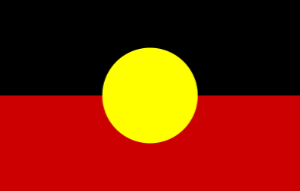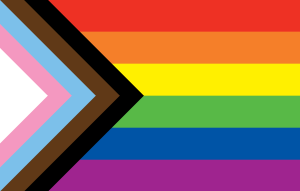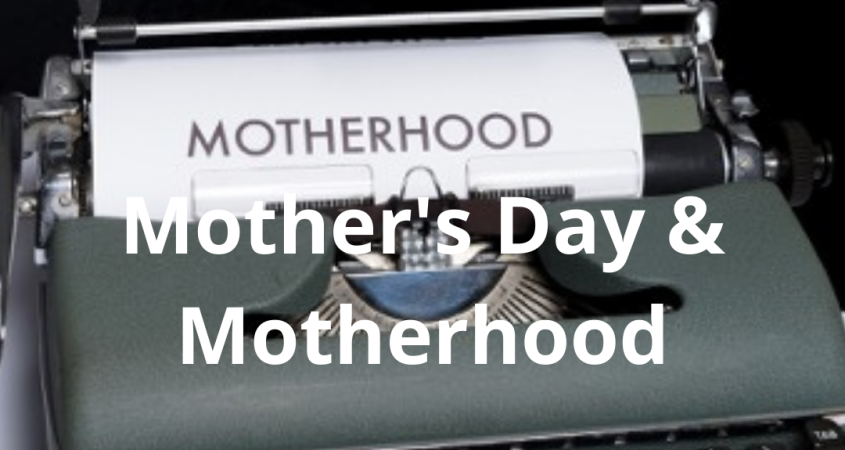Mother’s Day & Motherhood – More than Meets the Eye
Celebrations of motherhood began in ancient history with worship of a mother deity – Isis in Ancient Egypt or Cybele and Rhea in Ancient Greece. Later, Mothering Sunday in the UK was originally dedicated to the Mother Church and later broadened to honour human mothers.
Mother’s Day as we now know it, was begun in the US by Anna Jarvis in 1905, the year her own mother died. In 1914 President Woodrow Wilson proclaimed the second Sunday in May an official holiday in the US and we in Australia have followed suit, while some other countries choose a different date.
The simple celebration envisaged by Anna Jarvis, a way of honouring her beloved mother’s outstanding community service during wartime, quickly became controversial. Anna was disillusioned when commercialism became the foreground focus defeating her vision of a very personal way for people to celebrate the special bond between a mother and her children. She later worked hard to have the holiday removed from the calendar of national holidays, and financed lawsuits against commercial profiteers. The failure of those endeavours is obvious when we look at current retail statistics.
Before we rush out to succumb to commercial pressure to demonstrate our appreciation of mothers, foster mothers, grandmothers, and great grandmothers who may, or may not, have played an invaluable role in our lives, let’s look a little deeper. What does motherhood and mothering mean to people of different ages and very different circumstances? Is it a day of celebration or a day of sorrow? For many it may be both.
Who and What is a Mother?
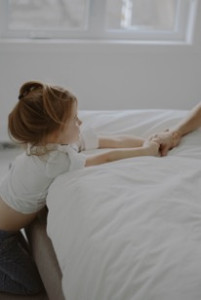 We are mothers if we have given birth to, adopted, or fostered a child.
We are mothers if we have given birth to, adopted, or fostered a child.
Some of us are mothers by choice, others by accident, and some have little or no choice.
Mothers come in all shapes and sizes and a variety of colours. We have a wide range of personalities, belief systems, abilities, social and family environments and support systems. Some of us are rich, some are poor, and many are in between.
We have different hopes and dreams, for ourselves, and for our children, and we have different mothering styles.
Becoming a mother is simply the beginning – ‘mothering’ is a different story. So how would we define ‘mothering’? In the past, and perhaps currently for many, ‘mothering’ has involved the expression of stereotypical female virtues – gentleness, self sacrifice, being protective, expressively loving, and always putting the needs of others first.
Education, the right to vote, financial independence, community support services, and safe methods of family planning have all contributed to changes in the way women interpret and express ‘mothering’.
Does Mother’s Day in its current form reflect these significant changes in women’s roles and in their ‘mothering’?
Unwrapping Mother’s Day
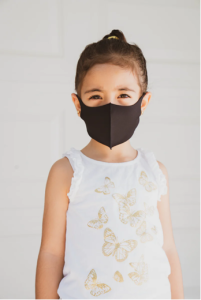 This year, more than 12 months since the Covid-19 Pandemic irrevocably changed our lives, my own thoughts about Mothers’ Day, and perhaps yours, are different to those of previous years.
This year, more than 12 months since the Covid-19 Pandemic irrevocably changed our lives, my own thoughts about Mothers’ Day, and perhaps yours, are different to those of previous years.
Most of us have been confined to smaller pastures, our geographical boundaries constantly changing as ‘hot spots’ flare, then subside. Maybe others are like me and find themselves compensating mentally and emotionally by nudging symbolic boundaries and letting thoughts roam free of restrictions. We can still travel far afield in imagination, re-live memories of places we’ve already explored, and connect via zoom, face-time, email and text messages with loved ones across the miles that separate us.
As valuable as those connections are, they can never quite measure up to feelings stimulated by face-to-face contact, to the pleasure of warm hugs and the energy stimulated by ecstatic reunions.
As I write these words, I’m instantly aware of folk dear to me whose first or latest grandchildren have been born overseas, or even in other states, during this time of separation. My heart aches for them, knowing how much they long to hold those precious bundles in their arms, to savour the unique smell of a newborn child, and to begin a bond that will endure for life. Mother’s Day this year is likely to be intensely emotional as these loving folk miss their children, and their grandchildren – a double dose of grief – while still feeling joy as they see loved faces on screens. I imagine them trying to transport themselves through the E waves, every fibre of their being reaching out to convey the depth of their love.
But, it’s not only pandemics or geography that separate mothers from their children. Estrangement, incarceration, alcohol or other drug dependence, mental illness, children whose whereabouts are unknown, and complex custody issues created by separation and divorce create their own grief, largely unseen by the celebrating community.
Many mothers will grieve on Mother’s Day because their children have died, their tears of ‘liquid love’ shed in private. The death of a child hurts, a hurt that is permanent and largely unseen, whether through miscarriage, stillbirth, neonatal death, illness, accident, homicide, or suicide, the pain often exacerbated by the sights, sounds and smells associated with family celebrations.
Years ago, a mother I was counselling after the death of her only child asked the poignant question “Am I still a mother?” We talked about what motherhood really meant, and what it meant to her. One definition (I can’t remember the author’s name) suggests that ‘motherhood is caring for and nurturing children with the deepest love.’ This grieving mother cared for her dead child in her heart and mind with a love that was no less deep than when he was alive. Of course she was, and is, still a mother, and will be forever.
A close friend who’d been forced to relinquish her child to adoption, experienced Mother’s Day as a day of endurance until she and her son were re-united. She survived those painful early days by focusing attention on her own mother until she was able, with encouragement, to claim her rightful place in ‘the mothers’ club’.
A Personal Perspective of Motherhood
 Motherhood is not an easy life path and perfection in that role is virtually unattainable. When I dreamed about being a mother, I set the bar high, and like many mothers before me, failed to reach many of those lofty goals.
Motherhood is not an easy life path and perfection in that role is virtually unattainable. When I dreamed about being a mother, I set the bar high, and like many mothers before me, failed to reach many of those lofty goals.
The mothers we all become will be determined by so many things, including the nature and health status of the children we produce. Some children bring out the best in us almost from the moment they are born, while it may take longer to bond with others. Few of us would meet the idealised standard of mothering depicted in ‘Good Housekeeping’ magazines of the past when we are sleep deprived and struggling to soothe a baby with colic. These unrealistic standards are even more difficult for mothers whose children are born with health complications that require attention 24/7.
If we add other factors like our age, mental and physical health, personality, financial status, geographical environment, support network, adaptability and creativity, or lack of, we begin to understand the truth expressed in the familiar quote ‘it takes a village to raise a child’.
Perhaps even more important to the way we carry out our role is the kind of mothering we received as children. My own mother was expressively loving and creative, despite the heart- wrenching difficulties of her own childhood. I thought she was beautiful and I love her still as I loved her then. But, she occasionally experienced what I call ‘break through bleeds’ of grief from her childhood, and those ‘bleeds’ had an impact on me and my sisters.
I married very young and moved far away from that nurturing environment, from everything familiar, my new husband the only person I knew, and I didn’t really know him very well. I was acutely homesick.
The birth of my first child a year later was the beginning of my separate, adult life, the stimulus for growing up.
I’ll share a poem I wrote just after my son’s birth, the poem itself a revelation of my youth, naivety and vulnerability.
I am a mother,
The soft warm weight of responsibility
Cradled in my arms
Confirms my newfound status.
Excited, scared, I take my place –
A link in the creative chain that stretches
Through eternity.
I look at you my son, my firstborn child
And want so much to be the ideal mother of my dreams –
Gentle, strong and wise, cocooning you with love.
I want you to enjoy the magic years of childhood
Unencumbered by my insecurities, my fears.
A child myself, in woman’s clothes, I look at you
And wonder who I am , and who you’ll be.
What do you see when you look at me
with trusting eyes, my tiny son
your separate life so new begun?
Like mothers forever, I know that there are many things I would change if I could live those years all over again. However, the goal of perfection would no doubt remain just as exhausting and illusive, my mistakes as numerous a second time round, simply different.
Quotes from ‘The Mother’s Club’
I asked a number of women to describe what motherhood means to them. Their quotes range from expressions of regret to those of profound love.
“Motherhood to me means an indescribable feeling of pure love. It’s the hardest but greatest job I’ll ever do. It means never again being selfish as there is a new number one, a new priority. It means physically feeling every bump, bruise and harsh word, protecting with your every fibre, lying awake until they’re asleep, holding your breath until they’re safely home. It means being a mentor, carer, provider, protector, playmate, cook, cleaner, teacher. Motherhood also means having a new understanding of your own mother.” E.J.
“I think I’m too selfish to be a mother. I resent the fact that I have no time for myself, that I’m too exhausted at the end of the day to enjoy my husband. Everything I do seems to be taken for granted. I think I signed up for cute babies, not noisy, messy, back answering teenagers.” S.J.
“I think becoming a grandmother was even more special for me than becoming a mother. Being older and having a better perspective about life meant I was more relaxed, less precious about everything. When I became a great grandmother I felt full to bursting, as if I’d circled the earth.” D.E.
“The most wonderful experience of my life.” R. M.
“I wish I felt as competent as a mother as I do in my corporate role. I find myself hanging out for Mother’s Day cards to see what the kids have written about me, as if they’re a kind of KPI.” Roslyn
“I’m one of those women who’s ‘a good enough mother’, not one of the super women I see on American TV shows. I’m a bit rough and ready, a mediocre cook, and the house is always a mess. But I think the kids know I love them.” J.B.
“I’m not a very touchy feely mother; I try to set an example, be the kind of role model that encourages them to follow their own dreams and not be what they think others expect of them.” Beth
“My mother keeps letting me know what a bad mother I am, but I suspect her mother did the same to her. I think my kids love their grandmother more than they love me, and I don’t blame them.” A.C.
“Motherhood has meant heartache, worry and loneliness since they became adults. My children rarely visit or call me, their lives are so busy I don’t really have a place.” Alice aged 80
“I know I haven’t lived up to all of my children’s expectations, and that some aspects of me that I value are appreciated more by other people’s children. I console myself by believing that I can give those things to life’s children, and that my children will find what they think are missing ingredients from a variety of people. None of us can be all things to all people, even our children.” Ruby, 65
I could share a variety of quotes forever, but I think any of us with women friends will be pretty familiar with the wide range of thoughts and feelings we all have about motherhood. We might answer the same question differently from day to day, week to week, year to year, answers all dependent on the prevailing circumstances of our lives at the time.
Motherhood Denied
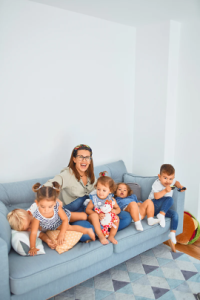 Some of my friends and colleagues have been denied the experience of carrying and giving birth to their own children. I asked several of them how Mother’s Day and its attendant celebrations affects them and they generously shared their reactions.
Some of my friends and colleagues have been denied the experience of carrying and giving birth to their own children. I asked several of them how Mother’s Day and its attendant celebrations affects them and they generously shared their reactions.
“Not having the children I’d always dreamed of means living with chronic sorrow…the ache never goes away. I had the very good fortune of having a wonderful mother, and her example, as well as being someone who has always loved children, made me feel that I would have been a very good mother. Knowing that only compounded my sadness. Marrying for a second time a wonderful man who came with young adult and teenage children, provided me with the gift of stepchildren, two who have adopted me as their ‘Mamita’. Now I also have grandchildren – blessings indeed! Although I am very grateful for them all, the heartache remains deep inside, though not as acutely as earlier in my life.
Nothing is the same as having my own children – the empty space remains. There was a time when I could barely make it through Mother’s Day. These days, it’s much easier, especially when my stepdaughter sends me a loving Mother’s Day card.” B.B.
Several other women shared very similar feelings and have learned to moderate the aching pain of emptiness by loving nieces and nephews, choosing professions like teaching, nursing, coaching, and many more that allowed them to work with children. Some have opened their homes to neighbourhood children, spending many shared hours cooking, reading, playing games, or doing craft.
Others have fostered or adopted children and some have worked as their advocates in medical or legal settings, or made donations to children’s charities. Writing stories for children or illustrating books has proved to be a creative outlet for other childless women, their way of leaving a lasting legacy by touching children’s hearts and stimulating their imaginations.
Mother’s Day through the eyes of a Grieving Child
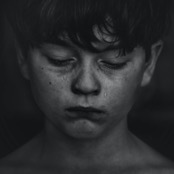 Preparations for Mother’s Day at ‘A Friends’ Place’ are always poignant. Children of all ages make cards and tell stories of the mothers they love and miss, touching the hearts of their counsellors every time. We look at them and think of the women who should be tangibly present in their children’s lives, loving them, enjoying them, and feeling proud. The contributions mothers have made to their lives live on in precious memories, and will do so forever.
Preparations for Mother’s Day at ‘A Friends’ Place’ are always poignant. Children of all ages make cards and tell stories of the mothers they love and miss, touching the hearts of their counsellors every time. We look at them and think of the women who should be tangibly present in their children’s lives, loving them, enjoying them, and feeling proud. The contributions mothers have made to their lives live on in precious memories, and will do so forever.
Young adults whose mothers died when they were very young still find Mother’s Day painful.
“My father subscribed to the notion that healing from grief meant forgetting the person who died, so Mother’s Day has always been a day of mixed emotions for me. It highlights how I was forced to connect with my stepmother and disconnect from my birth mother, to be compliant in the enforced silence, to never speak about her. It was a day that felt like a manufactured event in which I felt separated from what the community around me was embracing. Not until the birth of my own children has it felt like a day I can legitimately access.” B
“My teacher wouldn’t let me make a Mother’s Day card for my mum because she was dead. She told me to make one for my grandmother or aunty instead. I refused to go back to school for a whole week.” E, aged 8
“My father told me to make a Mother’s Day card for his new wife who he said was now my mother. If they hadn’t forced me to call her ‘mummy’ I might have liked her, but that’s impossible now.” C , aged 9
Inevitably, the children who deal with Mother’s Day best are those who have been allowed to speak about their mother, to honour her and include her in their lives. The step mothers who were, and are, genuinely loved, tend to be those mature enough to let step children decide what to call them, and to make it possible for birth mothers to remain part of the family dynamic.
Celebrating Mother’s Day 2021
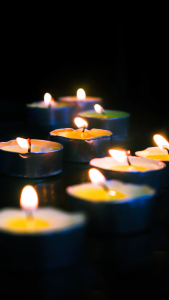 My family has never done the present giving version of Mother’s Day. Tea and burnt toast were the order of the day when the children were young, along with hand made cards and messages, and these days, phone calls and text messages are the highlights of my day.
My family has never done the present giving version of Mother’s Day. Tea and burnt toast were the order of the day when the children were young, along with hand made cards and messages, and these days, phone calls and text messages are the highlights of my day.
Last year when I downsized in preparation for a move to a smaller home, I had to let go of what seemed like a hundred years of letters and cards from children, grandchildren and great grandchildren. I chose to keep those that meant most to me, those that really touched my heart. This year, I’ll take them out, re-read and re-absorb the essence of their message.
I’ll light candles, many candles. One for my daughter who died, one for each living child, one to represent grandchildren, and another to represent great grandchildren. I’ll light candles for my mother, my grandmothers, and my great grandmothers. I’ll light a candle to represent grieving mothers, another for women who longed to be mothers, one to represent mothers and grandmothers separated from their children. And I’ll light a large candle to represent all the grieving children in the world who would give their right arm to have their mothers back with them for just one day.
I’ll keep the day simple and personal, as it was always meant to be and I hope many of you will join me in spirit and do the same.
As mothers, we can remind ourselves that we are ‘the bows from which our children as living arrows go forth’ and not the keepers of their souls. Their souls dwell in the house of tomorrow, which we cannot visit, not even in our dreams.’
Kahlil Gibran
We can hope that we’ve all done a good enough job to be thought of with love.
If grief for your mother or child is new and raw, and the sights, sounds and smells of Mother’s Day celebrations this year feel overwhelming, help is available at ‘A Friends’ Place’ or the NCCG Outreach Service.
Help
Help is always available – at ‘A Friend’s Place’ or by contacting our outreach service.
Dianne McKissock OAM
NCCG Outreach Support Service
Email support for dying and bereaved people and anyone involved in their care
